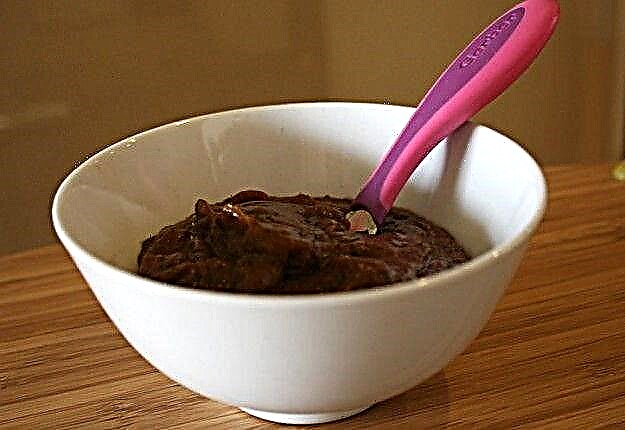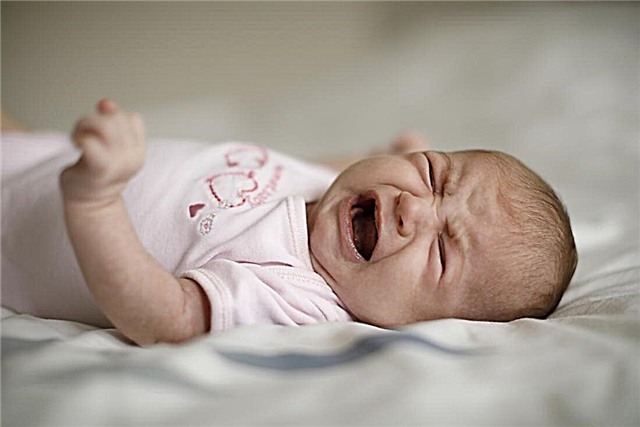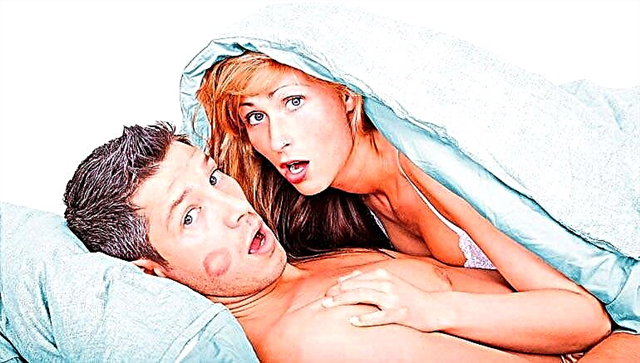The first year of an infant's life is distinguished by a large number of new emotions and discoveries, both for parents and for the baby. If for three months the newborn mainly eats and sleeps, then the baby's teeth begin to cut. For each baby, this process can last for a different time: with one baby it is easy to survive such moments, while the other has a high temperature. Diarrhea on the teeth of a child is not uncommon, so you need to know how much he will bother the baby, and what to do in case of deviations from the norm.

The appearance of the first teeth
Teething symptoms
The very first incisors climb from the crumbs in the period from 5-6 months. Then the stages of tooth growth are gradually distributed over 2 years. Every teething tooth reduces the baby's immunity, which, in turn, can cause a risk of pathogenic microorganisms entering the body. That is why so often diarrhea can occur in a child during teething.
To start taking any action, the mother must clearly state that diarrhea is not the result of any infectious disease.
What other symptoms indicate the early appearance of a tooth in a baby:
- The gums are swollen and swollen;

Gums swell when erupting
- Salivation increased, became profuse;
- The child pulls everything into his mouth, wants to gnaw toys, bagels, teethers;
- Intense anxiety;

The child is very naughty, worried about teething
- The temperature may rise (but not higher than 38 degrees);
- Sometimes vomiting occurs;
- Physiological disorders of the stool: diarrhea or constipation (more often in formula-fed children).
Important! There are also some children whose teeth growth process is no different from ordinary days. It is rather an exception to the rule.
How to distinguish eruption from illness
Diarrhea can be a symptom of more than just teething. Why there is a disorder of the stool with the growth of teeth, doctors still cannot give a scientific basis. Opinions agree that children in such a difficult time for them are trying to take everything in their mouths, and most objects contain germs and bacteria. The latter, getting into the gastrointestinal tract, cause the development of diarrhea.
If the rate of reproduction of bacteria is too high, and the immune system cannot withstand such a strong effect on the body of microbes, an infectious disease may develop. The baby can also pick up some kind of virus, since his immunity is greatly weakened.
Disease symptoms:
- Diarrhea lasts more than three days, after the eruption of a tooth, it does not subside;
- Severe fever above 38.5 degrees, after knocking down, the temperature rises again after a while;
- The stool becomes mustard in color, foams, has an unpleasant, putrid odor;
- The child is anxious, his tummy hurts;
- Complete lack of appetite;
- Vomiting, severe dehydration.
Causes of loose stools when teething
Experts identify the following main causes of diarrhea during tooth growth:
- Since there is increased salivation, saliva begins to actively wash the oral mucosa, thereby preventing the penetration of pathogenic microflora. The latter, if it enters the stomach, accelerates the peristalsis of the gastrointestinal tract, which causes loose stools;
- Immunity drops dramatically. At such a moment, rice is great to catch any infection. In summer, children often get sick with rotavirus, which is characterized by watery stools, fever, and vomiting. In winter, a child can catch ARVI;
- Microbes and bacteria get in from the outside, because the baby always takes something in his mouth;
- If, when the teeth come out, the diet of the crumbs is wrong, then a double load is put on the pancreas. Failure occurs, intoxication, as a result, diarrhea occurs;
- Hereditary factor, somatic diseases in the form of tonsillitis, gastritis, pancreatitis. If the parents reacted sharply to teething, then in the baby this moment can also pass in a severe form.
How to react correctly
When a baby has diarrhea with tooth growth, it usually does not require treatment. Mom should take a number of activities so as not to complicate the already difficult moment for the baby:
- Keep order in the apartment. Since the baby will pull everything into his mouth, it is necessary to take care of the cleanliness of the house in advance: wipe the sides in the crib, playpen.
- All toys should be washed, especially teethers and rattles.
Note! The crumb will try to gnaw everything, and will subsequently choose solid objects. This is because mechanical action on the gum tissue helps it relieve itching and pain.
- Reconsider your nutrition (if the mother is breastfeeding), if the baby is older, then offer him those foods that will hold the stool together. It is also recommended to give more water, breast milk or formula to prevent dehydration.
- No antibiotics if the diarrhea is caused by tooth growth. To normalize the bowel function, it is allowed to give "Linex", with frequent diarrhea - "Regidron". You must first consult a pediatrician about taking medications.
How long does diarrhea last
How many days does diarrhea on a child's teeth usually last - from 2 to 3 days. If it lasts longer, there is a chance of contracting an infection, so seek medical attention.
Teething diet
It is imperative that during this period, the baby must be offered a plentiful drink. Dehydration of the body threatens with extremely serious consequences for the child.
At the same time, it is also important to follow a certain diet, which will help to establish the digestive processes. If the baby has not yet been introduced to complementary foods, then the nursing mother follows this diet.
Completely excluded:
- dairy and fermented milk products;
- fatty food;
- packaged and freshly squeezed juices;
- all fresh fruits and berries (excluding bananas);
- fat meat.
Included in the diet:
- boiled rice or rice jelly (broth);
- mashed potatoes;
- compote or a decoction of dried pears, apples;
- jelly;
- crackers, drying, lingering biscuits;

Dryers, biscuits are a good way to soothe itchy gums
- bananas and baked apples;
- strong tea, it is permissible to add a little sugar to it.
Additional Information... The basis of the menu should be light soups with chicken (second) or vegetable broth, porridge (buckwheat, rolled oats and rice).
Doctor Komarovsky's advice
If, during teething, diarrhea appears in an infant, then, according to the Russian pediatrician Dr. Komarovsky, it should be treated if the diarrhea continues after three days.
The doctor does not recommend deliberately treating teething with medicines, but you cannot refuse help, especially if the baby is very ill.
Note! Komarovsky recommends knocking down temperatures above 38.5 degrees with “children's Paracetamol”. This drug will not only reduce fever, but also numb the gums, so the baby will feel much better. "Ibufen for children" and "Panadol" have proved to be very good pain relievers. However, any remedy should be given in the most exceptional cases.
Increased salivation is a symptom of hormonal changes. Neither doctors nor parents can influence them. Usually this symptom is observed long before the appearance of the first incisor. Drooling can flow, starting from three months of a baby's life.
Loose stools, according to Komarovsky, do not need to be treated - this is a short-term, non-protracted phenomenon. It will not cause further complications. Usually, everything is limited to one to three episodes of diarrhea, and the long-awaited tooth becomes visible.
How to help with itching, even those parents who have no experience with children know about it. The so-called teethers in the form of rings, toys are made of a special material with a bumpy surface and are perfect at this time. As soon as the baby takes the teether in his mouth, his condition will be significantly alleviated, and he will be able to scratch what itches. In addition, such a toy will relieve pain and swelling of the gums.

Teethers relieve itchy gums
Important! Gels and special dental ointments should not be used without unnecessary necessity. They contain a fairly harmful substance that, with frequent use, will harm the baby's health.
The doctor notes that the bright symptoms that are inherent in the process of tooth exit are not as common as the manufacturers of children's oral sprays and gels are positioning. It also happens that the mother notices the first incisor when it has already appeared and simply begins to interfere with breastfeeding.
When to see a doctor
In rare cases, when teething occurs, abnormal situations occur that require prompt intervention and treatment:
- The baby flatly refuses milk, a runny nose appears, severe irritability, which usually does not happen, salivation is unnaturally increased;
- The stool becomes foamy, mucus, blood are present in it;
- Diarrhea turns green;
- Against the background of diarrhea, severe dehydration is noted, the fontanelle sinks;
- Vomiting joins the disorder.

Weakened condition and vomiting in a child
If you take even the simplest measures to alleviate the situation with teething in a baby, minimize digestive upset, then this period will pass as calmly and almost painlessly as possible for all family members. In the case when dyspeptic disorder is observed often, the child should be shown to a specialist. He will identify the cause of such violations and help the baby recover as soon as possible.



